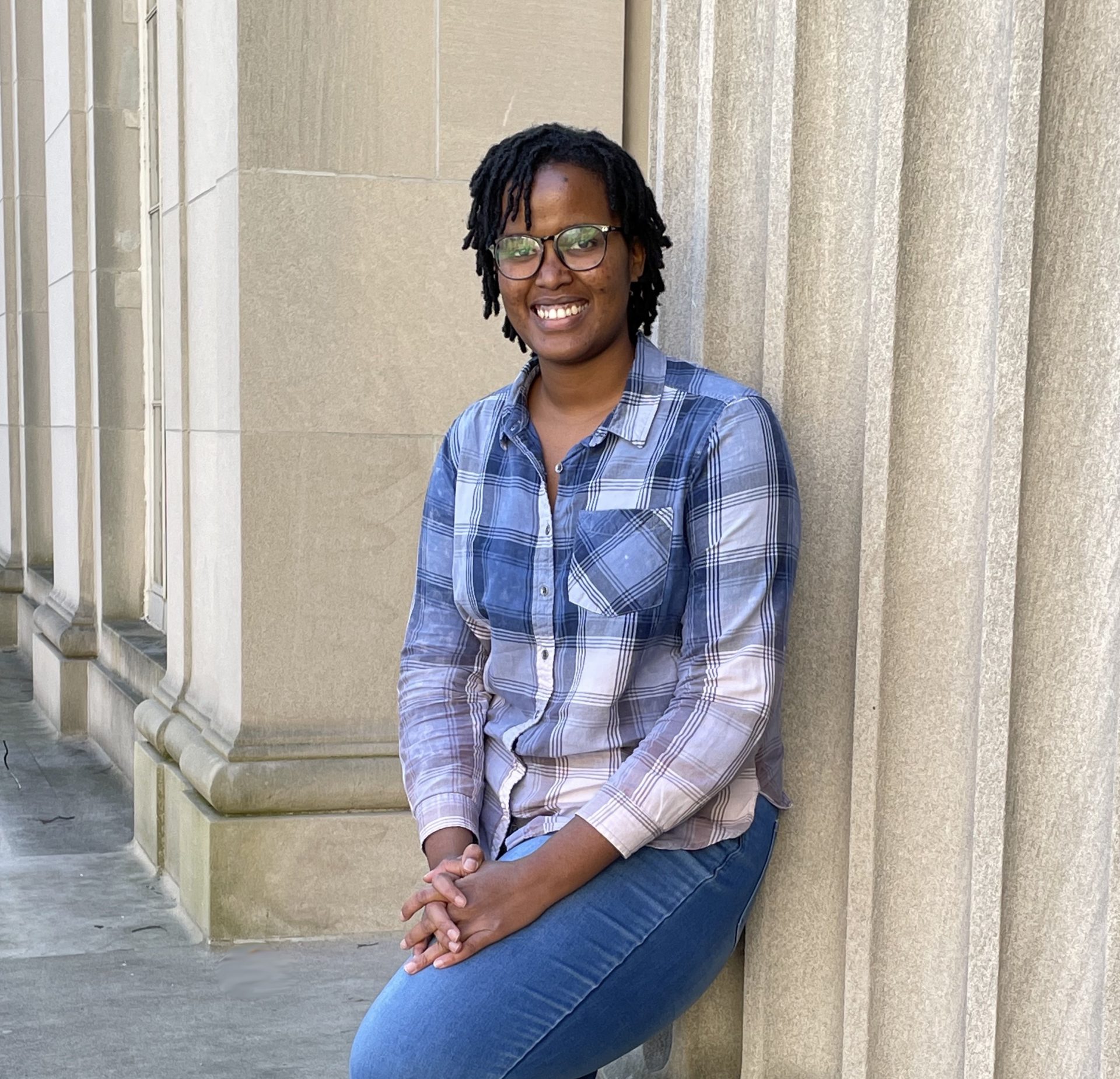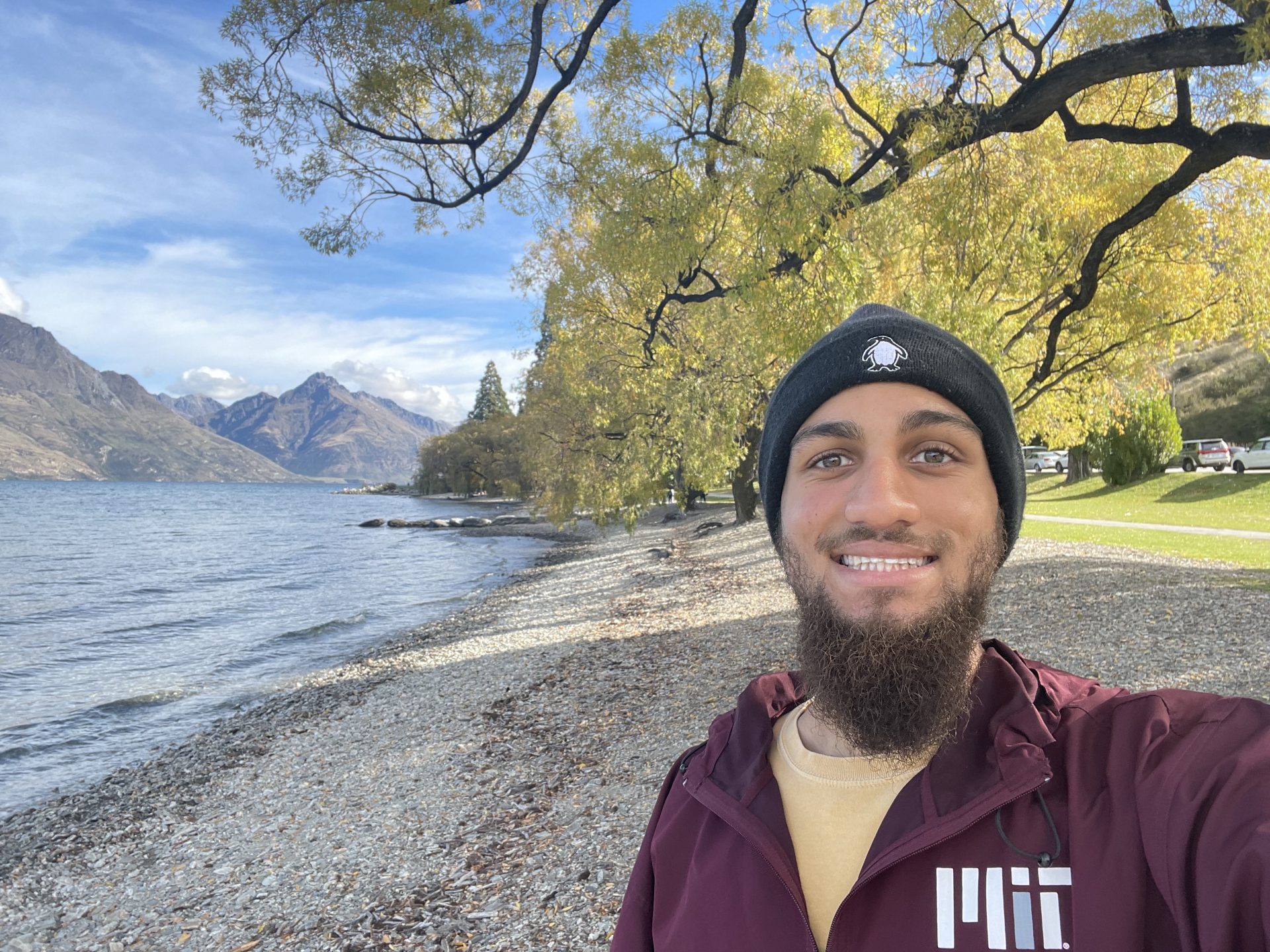Transformative is how I would describe it
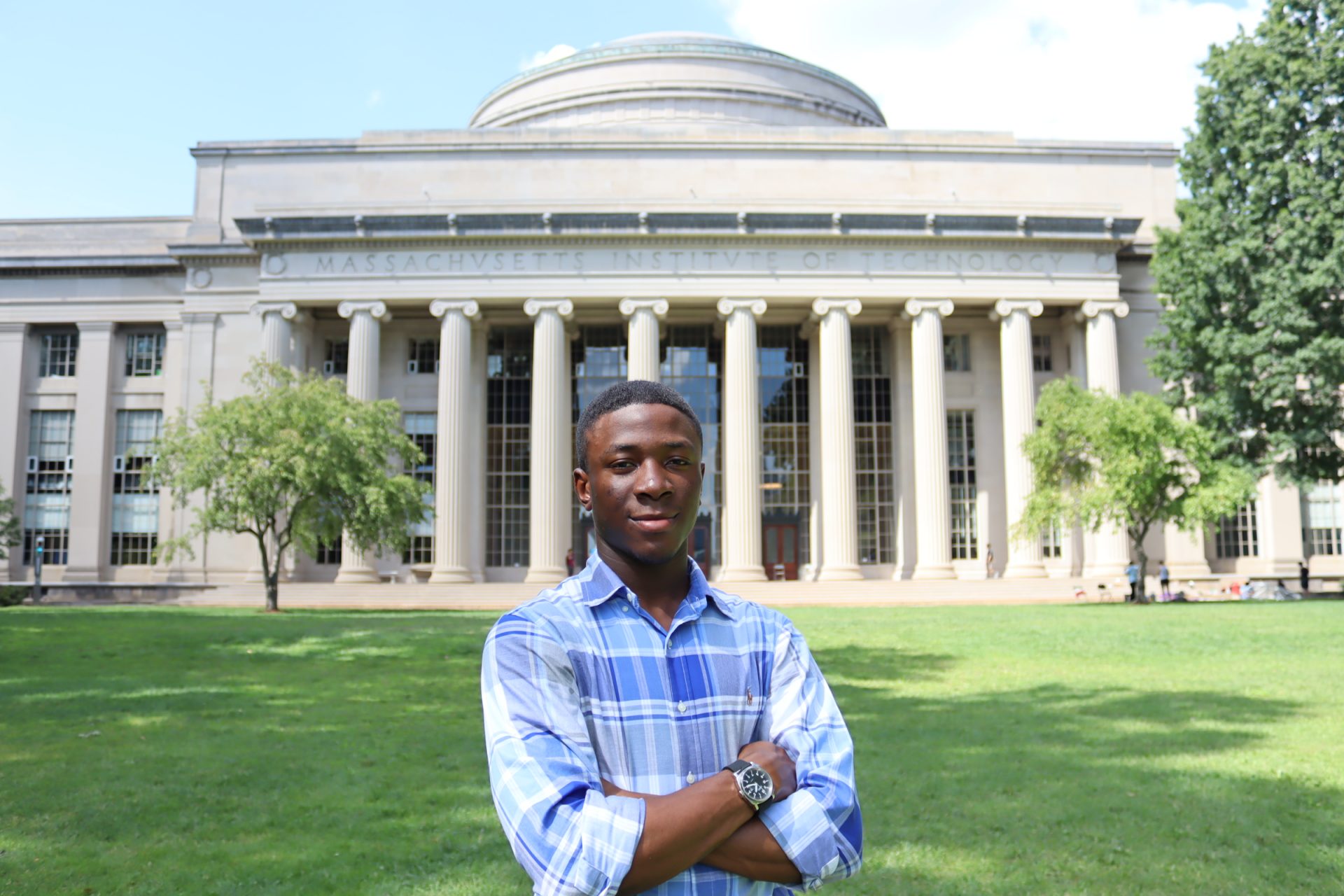
MIT junior Runako Gentles highlights his undergraduate experience in Course 1
Transformative is one word that I would use to describe my MIT undergraduate experience so far. My career and academic interests have drastically changed from high school until now. For years I grew up wanting to become a great physician, but after major experiences between my junior and senior year of high school, such as, participating in the Student Program for Innovation in Science and Engineering (SPISE) and engaging rigorously with the college application process, I became excited to pursue a degree in engineering at one of the best universities in the world. I applied to MIT with the intention of studying materials science and engineering. However, after attending various virtual orientation events in 2020, reading articles and watching videos to better understand my career aspirations, civil and environmental engineering (CEE) became my first choice for an undergraduate major. I decided to pursue this major because I became eager to learn about the environment, how to take care of it, and to become a leader who plays a significant role in the transition to a sustainable world.
During the Independent Activities Period (IAP) of my first year, I decided to participate in the CEE mini-UROP to get exposed to scientific research in the department. I worked in Prof. Ruben Juanes’ Lab remotely from my home in Jamaica due to the COVID pandemic, on a project that explored the use of machine learning to analyze earthquake data. My direct supervisor, Lluis Salo-Salgado, was a 4th year PhD student in this lab, and he guided me through this 4-week introductory research project. I got along very well with Lluis and I learned a lot from him about seismology, computer programming, clustering data using machine learning and doing scientific research. This project introduced me to Obspy, a Python toolbox to process earthquake data, which we used to analyze the space-time-magnitude distribution of earthquakes in Puerto Rico from 2019 to 2020. Our goal was to visualize whether different geologic faults in the region resulted in distinguishable earthquake clusters. We found that there were some clusters that could potentially be mapped to nearby faults, but further analysis would have been necessary to substantiate this result. I presented my research to the Juanes Lab members and also at the mini-UROP presentation showcase, which involved a mixed audience of staff, professors and students.
I enjoyed my introductory research experience during IAP, so I wanted to learn more. In the summer of that year I discussed with Lluis the possibility of working on a similar project to my mini-UROP with his guidance. He was excited to be my supervisor and in the fall semester of my sophomore year we had multiple meetings to discuss the topic with Prof. Ruben Juanes and two other mentors: Dr. David Castiñeira and Dr. Michael Fehler (EAPS). I expressed my desire to do work independently but with guidance on a project I could explore at my own pace and involving earthquake signals (seismograms). What really motivated me about this project is that time series data exist across fields in environmental engineering, so I knew that learning to work with them was a very useful skill that I could use in the future. I was given a dataset to work on and I spent the rest of the fall learning about it and doing initial preparation to dive into conducting research. For example, this involved taking Prof. Juanes’ Introductory computer programming class in which I learned MATLAB, and studying the thesis that would guide my seismic signal analysis.
During this fall semester I was also continuing my UROP in Prof. Desiree Plata’s lab with my direct supervisor, Nicolette Bugher, a first year PhD student at the time. I started working in this lab in the summer 2021 on a project that entailed analyzing diesel range organic compounds in water samples collected from shallow ground water sources near hydraulic fracking sites in West Virginia. This UROP was also a very challenging, rewarding and wonderful research experience from which I gained many skills and knowledge pertaining to environmental chemistry. Thankfully, I am currently a co-author for Nicolette’s paper in preparation entitled “Trace-level volatile organic compound occurrence in domestic groundwater wells in areas of extensive horizontal drilling and hydraulic fracturing activity.” Even though I am not currently working in this lab, I continue to regularly ask Prof. Plata for insight into my career path and often interact with my former lab group members in Building 48 where I have many Course 1 classes. I successfully applied to have my earthquakes project become an official UROP during the Spring. My UROP is entitled Classification of carbon dioxide injection-induced earthquakes using feature-based representation of time series data. The aim of this exploratory project is to apply machine learning to group earthquakes induced by carbon sequestration in Decatur, Illinois based on their characteristics. This will allow us to better understand the seismic sequence and possibly relate earthquakes to neighboring geologic faults, which can, in turn, improve our knowledge of the area and the impact of carbon sequestration. During the summer, this UROP was sponsored by the MIT Energy Initiative (MITEI), and with the help of MITEI workshops I was able to create a research poster and receive training on presenting research posters. I had the awesome experience of presenting my research poster at the 2022 MITEI Annual Research Conference to a mixed audience of professors, experts in industry and students.
I will be continuing to work on this UROP throughout my junior year with the goal of writing a paper about this project’s learnings. My UROPS and mini-UROP in the Juanes Lab and Plata Lab have provided wonderful research experiences, which will undoubtedly propel my future academic and career path.
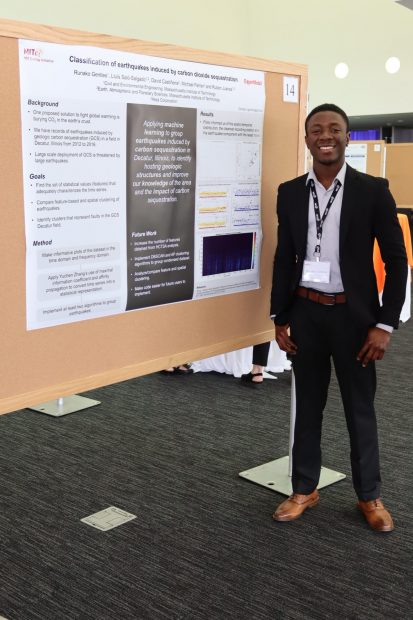
Runako Gentles at 2022 MIT Energy Initiative Annual Research Conference giving poster presentation on his research in the Ruben Juanes Lab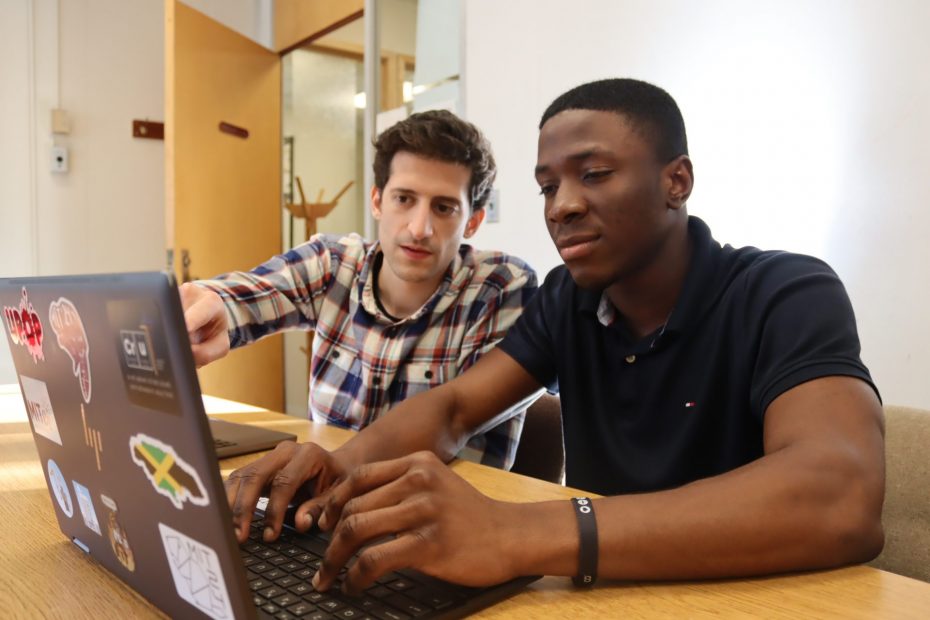
Runako Gentles with direct supervisor Lluís Saló Salgado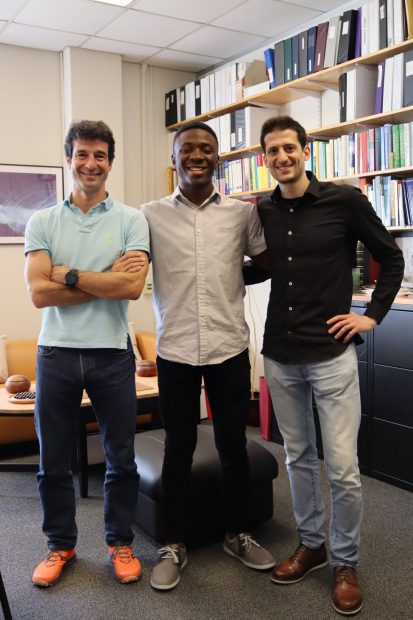
Runako Gentles with current faculty supervisor Prof. Ruben Juanes (left) and direct supervisor Lluís Saló Salgado (right)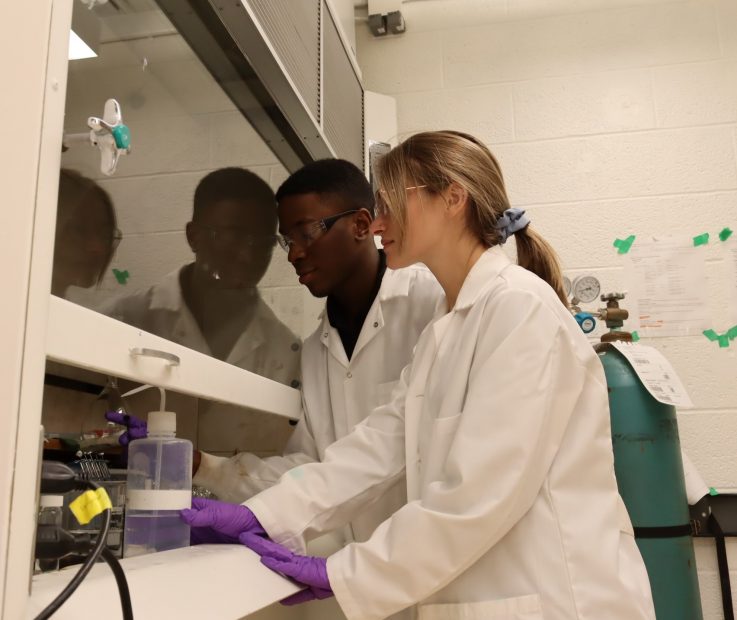
Runako Gentles with former direct supervisor Nicolette Bugher in the Plata Lab


